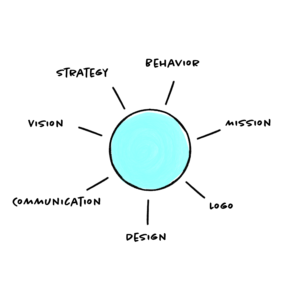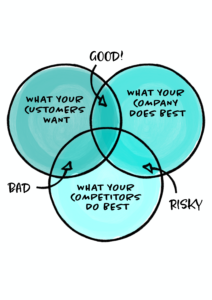Building a brand. You can either hire an expensive agency, or you can build the brand around the following essential questions:
- What useful skills do I offer?
- Who is my (dream) target group?
- How do I differ from competitors?
- What is the biggest weakness of my competitors?
- What is the character and personality of my company?
To put it another way, you could adjust your brand using the following template:
I am helping _______ (WHO) with my ______ (WHAT) so that these _____ (WHY)
Example:
With the help of my coaching expertise, I help golf beginners to achieve rapid learning success, develop fun in the game of golf and reach the desired level.
Clients choose me because I offer ___________ over my competitors.
Example: Customers choose me because, compared to my competitors, I have developed a unique technique that guarantees quick recall of the correct technical sequences.

Areas of a Brand
Fantasy Name or Proper Name
For companies where the focus is on oneself, it is advisable to appear or trade under this name. Your own name is easier to establish in the market than a fantasy name.
One of the main reasons for this is that people remember personal names more easily than fantasy names. However, if the company consists of a large number of "equal" employees, it is advisable to ensure that the core competence is already expressed in the brand.
It doesn't take much to get started with good branding. Give your company and products a unique name, repeat branding words and phrases, use visualization. Uniform communication is important. For this reason, repetition is important. In this way, over time, the essential values that you want to communicate penetrate into the consciousness of the recipient.
The Positioning
Positioning deals with finding gaps in the market and filling or occupying them with your own products. It's about ensuring that your products and services are perceived as unique and without alternative. That way, you don't have to do a lot of convincing to sell prospects your products.
If the product is successful in the niche, you always have the option of expanding out and opening up other markets and reaching other target groups. At this point you will have already built up a well-known brand and collected enough money to finance further expansion.
It is therefore better to start with a large fish in a pond (niche) than a small fish in a large lake. Ideally a niche where the target group is already repeatedly spending a lot of money on such services.
With clear and specific positioning, it is also less easy to make comparisons. You are not one of many. If you don't actively take care of the positioning and communicate it, the market takes care of it. That means your company is positioned by the market. If you have no positioning, i.e. no clear differentiator to your competitors, customers may only find you attractive because of your low price.
Therefore, one's own positioning should be carried out carefully in order to provide the customer with targeted incentives so as not to be attractive to customers solely because of a low price.
With a specialization, it is also easier to be perceived as an expert.

Find a niche that allows you to outperform competitors.
The Brand Building
When building a brand, it is very important that you align the positioning of your company in the center of communication. The brand name should be associated with your unique positioning. You can only achieve this if all departments in your company are purposefully coordinated in brand building. In this way you can build a strong brand and benefit from the following two main advantages:
- Reduced marketing costs as brand awareness brings in new customer
- Good negotiating position with regards to existing customers, suppliers and cooperation partners
The Specialization
With a specialization, you will be perceived as an expert in a very specific area. The specialist has a higher level of competence in a selected area, while the all-rounder has knowledge in many areas but does not have extensive knowledge.
As a specialist, you give customers the feeling that they are being offered a high level of benefit that they cannot get from an all-rounder. The customer is prepared to pay the specialist a higher price for this.
- You can promote the perception of being seen as a specialist with the following measures:
Book publications - Speaker at conferences
- Digital publications (blogs, YouTube, guest articles)
- Affirmation by customers (reviews or testimonials)
- Partnerships with well-known customers
- Interviews in magazines and trade journals
- Membership in professional associations.

0 comments